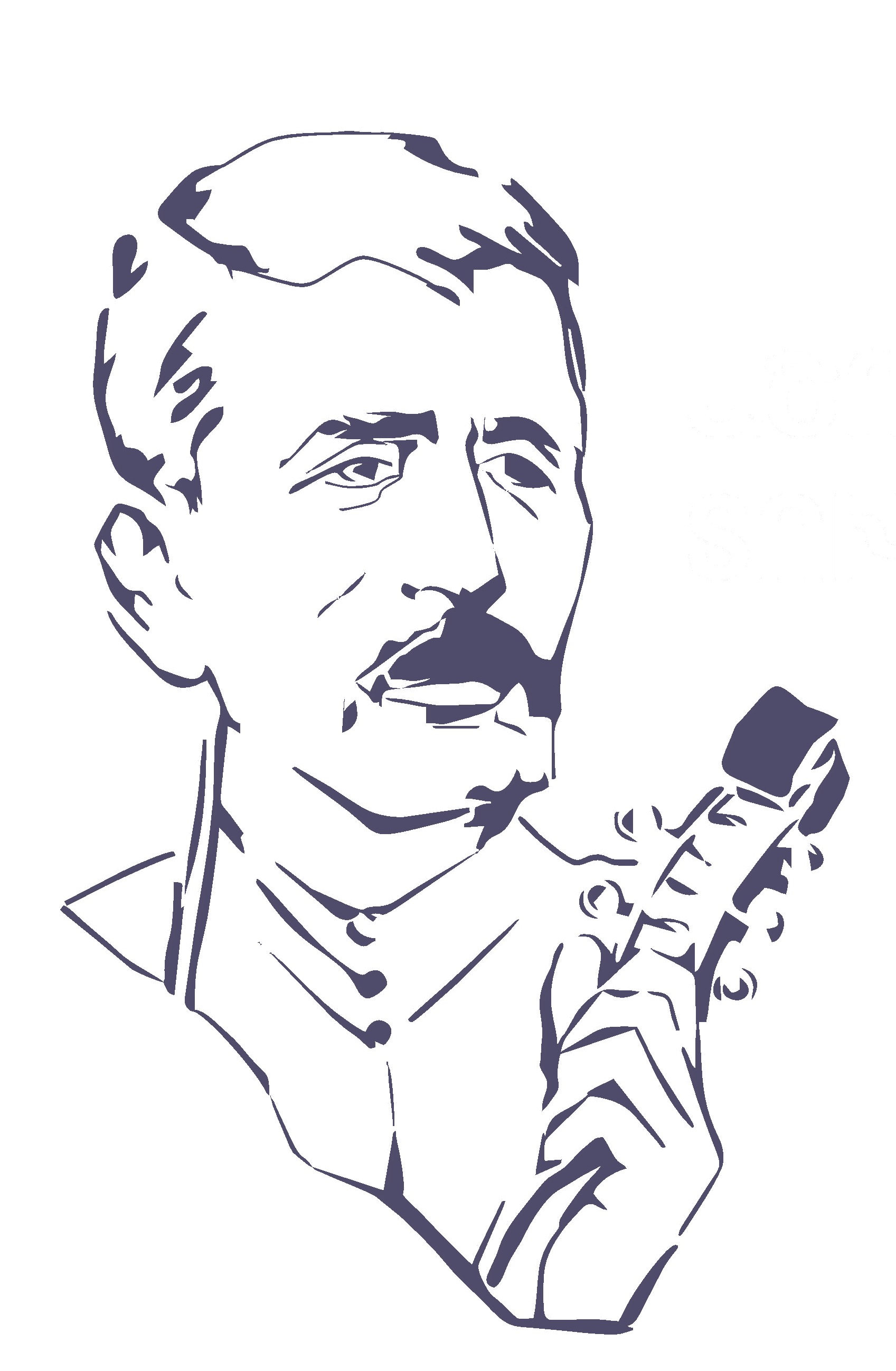- Ashugh Jivani
- About the Museum
- Visit
- 2
- Working hours9.00–19.00AdressAkhalkalaki: Kartsakh
- Services
- Contact

- Ashugh Jivani
- About the Museum
- Visit
- 2
- Working hours9.00–19.00AdressAkhalkalaki: Kartsakh
- Services
- Contact

Life and biography of Jivani
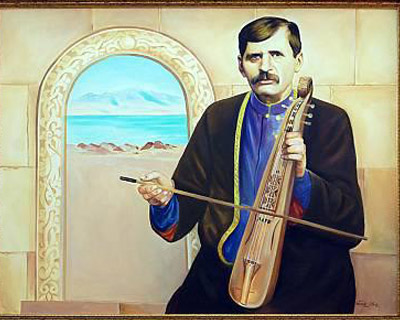
Ashug Jivani (Serovbe Stepanovich Levonyan) was born in 1846 in Javakhk, in the village of Kartsakh, Akhalkalaki region. As is known, his ancestors were the family of Bengoents Gaspar, who fled from Basen as a result of the Russian-Turkish war in 1830. After the death of his father, when he was six years old, his mother married and left for the neighboring village of Dadesh. Thus, Serovbe, along with two brothers, Kerob and Filippos, two sisters, Srbui and Marta, were deprived of their maternal care. Under the influence of the grief of parting with his mother, he later wrote his famous song “Mairik”.
Serovbe’s uncle, Martiros, a well-known person in Kartsakh, took care of the five orphans. Time and conditions did not allow Serovbe to receive a systematic education. He had just learned to read and write in the village school when his uncle took Serovbe out of the school and appointed him a pastor. His love for education, song and music had awakened in him from an early age. And it is no coincidence that he made his own musical instrument, from ponytail and wood, which was the prototype of the kaman.The young man’s love and inclination was noticed by a fellow villager ashug Siayi, who because of his dark skin tone was called Gara-Gazar. He agrees to take Jivani as a student. Jivani had been studying with him for five years. Soon he learned to play the saz, master the subtleties and peculiarities of ashug art, and compose songs in Turkish and Armenian, sometimes surpassing his master. According to the accepted order, the ashug Siayi five years later gave him the title of ashug and called him ashug Jivani, in honor of his father, who affectionately called him Jivanik.
In 1864, Jivani, together with his uncle, went to Tbilisi (Georgia), then to Alexandropol, which was considered the center of ashugs. In Alexandropol, in the Taloyanʼs cafe, which was then a famous gathering place for Armenian ashugs, going to meet those present, he sang songs composed by him and was praised from those present there. It was during these years that Jivani met ashug Sazayu (Aghajan) who visited Kartsakh, and he brought an offer to work together, after which they began performing together. First, they settled in Tiflis, performing in a cafe near the Church of St. Gevorg (then Petros Aslanyants) for a short a period of time acquiring name and fame. In 1868, Jivani moved and settled in Alexandropol, which became his second homeland. By 1871, he already had his own group, which regularly performed at the Taloyan brothers’ cafes. In 1872, Jivani married Ashkhen, the daughter of the owner of the cafe, Hovhannes Taloyan. They had six children, including a publisher-editor, an ashugologist, a bibliographer, (in the RA the title of Honored Art Worker was first awarded to Garegin Levonyan) Garegin Levonyan (1872-1947) and political, public, national figure Paruyr Levonyan (1884-1933) … Soon Jivani was elected “ustabashi” (chief master). In the 1880s his songs were published in various periodicals, in volumes of the songbook “The Nightingale of Armenia”.
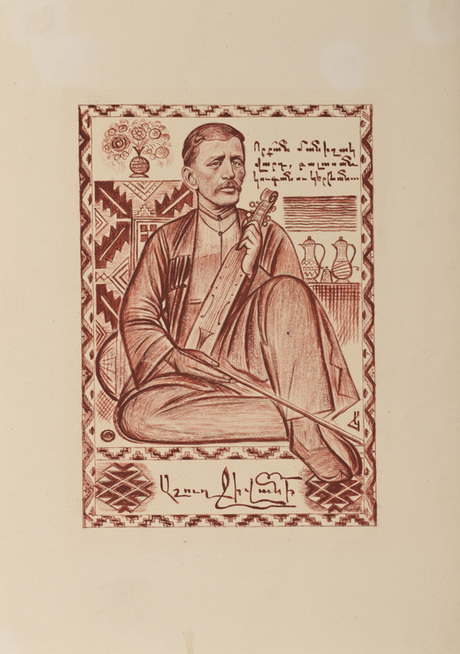
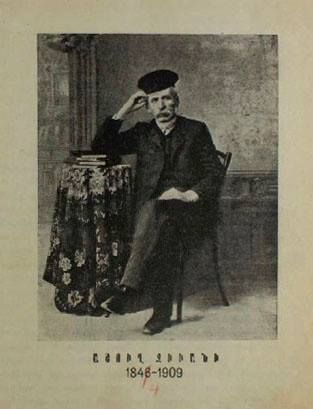
In 1895, Jivani moved with his family to Tbilisi (Georgia), where he lived until the end of his life. Having settled in Tbilisi, he strove to provide his family financially and most importantly – to give a good education to his children. The upbringing of his sons, their future always worried him, which was also reflected in a number of his songs. However, in Tbilisi, Jivani was unable to lead a more or less secure life. He was constantly haunted by want and poverty. His dream was “To have grace and intelligence to bring up my children until my death.” The financial situation of a large family did not improve, every day his health deteriorated; his already poor eyesight was weakened even more. Jivani, in order to restore his vision, went to Bulgaria, to the city of Plovdiv, then went to Vienna, but returned to no avail.
In the last years of his life in Tbilisi, Jivani performed in the cafe of Petros Aslanyan from Van, on the facade of this cafe there was a signboard “Cafe where ashug Jivani sings”. After a while, Jivani and his group moved to the Gaspars cafe, located opposite the St. Gevorg church. Cafe Gaspari was incomparably more spacious, and the place was lively, crowded. One of the customers of the Gaspari cafe was the national hero Andranik Ozanyan.
During the rise of public thought and the national liberation movement in the 1870s and 90s, Jivani’s love and lyric songs were replaced by songs of protest and rebellion. The loudest chord of Jivani’s lyre is patriotism. In his works one can feel the suffering and rebellion of his life for his culture, for a bright future. His work is a mirror of the Armenian reality of that era. He not only noticed and recorded the most important problems of this period – the prevailing injustice and violence, but also rebelled against them. Jivani preached to strive for enlightenment and science, love homeland and family, earn his living by his labor, never despair, because “unfortunate days will come and go.” He sang about solidarity, brotherhood, sang about the Motherland, as well as about pure love Many of these songs are sung today.
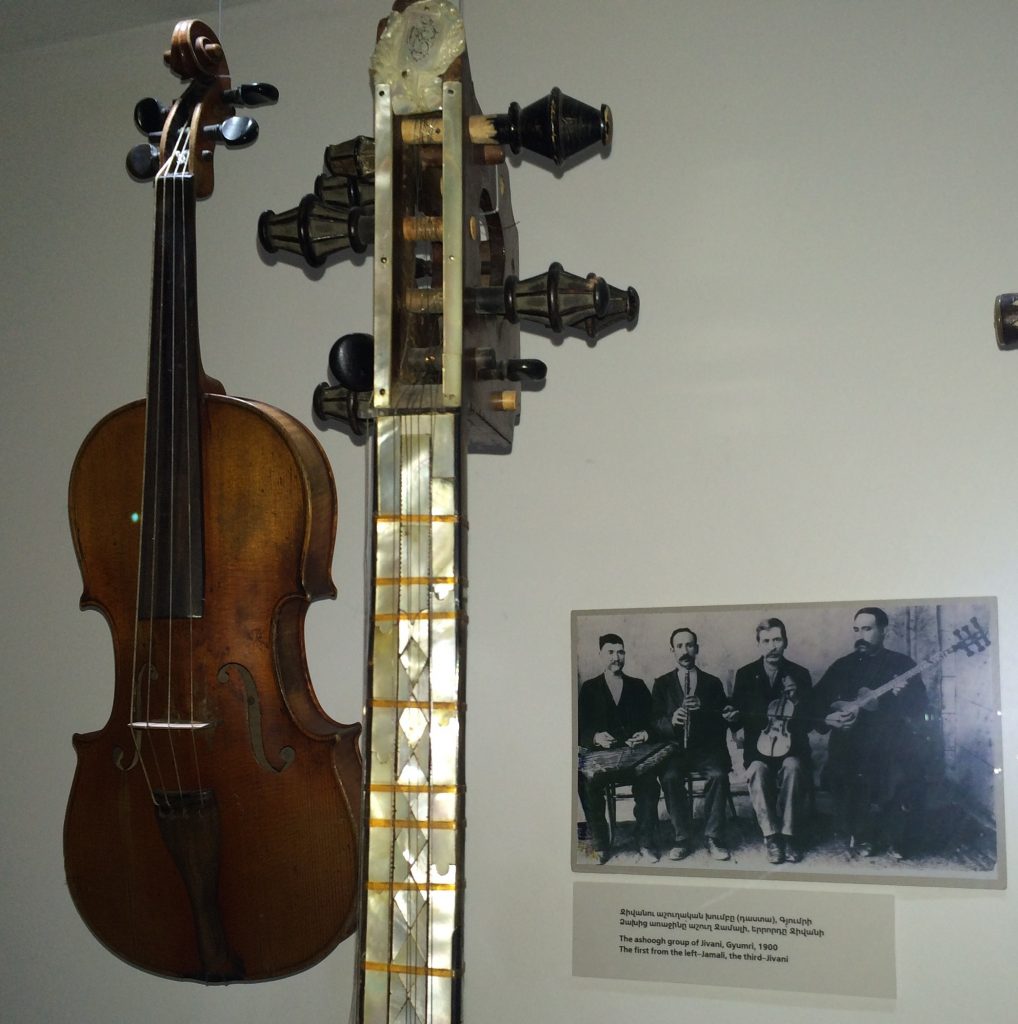
Jivani is a publicist, philosopher, moralist, composer, singer, poet and the greatest ashug of the 19th century in Armenian reality. He raised this art to a new level, created his own school, which in Armenian philology is called the national school of ashugs. Jivani played the violin on his knees, sang loudly and sensitively, as his contemporaries say, he had a very sweet voice. He was familiar with many famous people who then visited Alexandropol, the first meeting of Jivani and Avetik Isahakyan is interesting. The great poet, entering the cafe, did not pay attention to Jivani, who, offended by the poet’s attitude, improvised the song “Kankaravor Enker”.
Jivani died on February 24, 1909. Numerous representatives of different nationalities took part in the funeral of the famous ashug. Hovhannes Tumanyan and Avetik Isahakyan, who were in Metekh prison in those days, when the funeral process was passing by the prison, said goodbye to the great ashug from the window into the cage, waving handkerchiefs.
Jivani’s body is buried in the Khojivank cemetery in Tbilisi (Georgia).
About 1200 songs of Jivani have come down to us.
Subscribe
Be the first to know!
